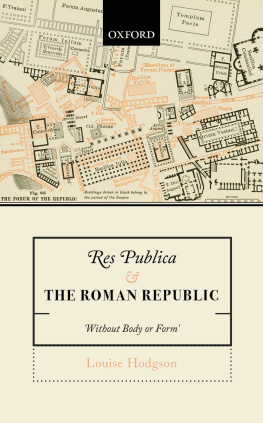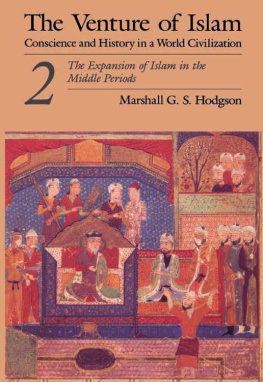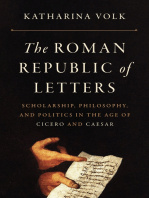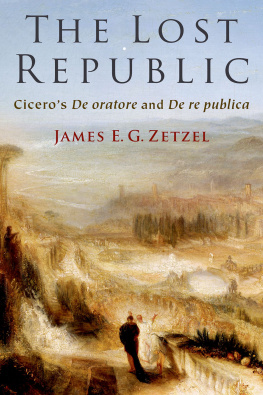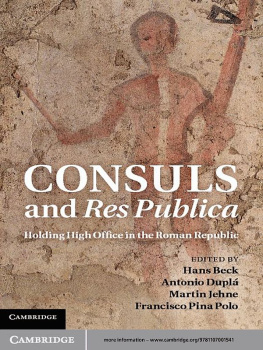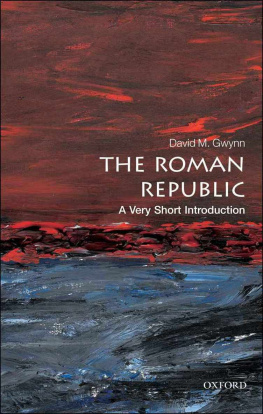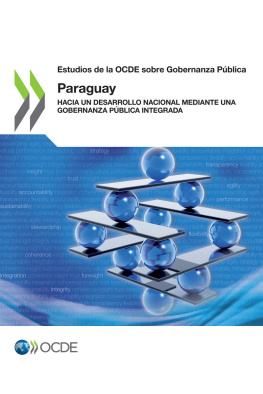Hodgson - Res Publica and the Roman Republic : without Body or Form
Here you can read online Hodgson - Res Publica and the Roman Republic : without Body or Form full text of the book (entire story) in english for free. Download pdf and epub, get meaning, cover and reviews about this ebook. year: 2016, publisher: OxfordUP, genre: Politics. Description of the work, (preface) as well as reviews are available. Best literature library LitArk.com created for fans of good reading and offers a wide selection of genres:
Romance novel
Science fiction
Adventure
Detective
Science
History
Home and family
Prose
Art
Politics
Computer
Non-fiction
Religion
Business
Children
Humor
Choose a favorite category and find really read worthwhile books. Enjoy immersion in the world of imagination, feel the emotions of the characters or learn something new for yourself, make an fascinating discovery.
Res Publica and the Roman Republic : without Body or Form: summary, description and annotation
We offer to read an annotation, description, summary or preface (depends on what the author of the book "Res Publica and the Roman Republic : without Body or Form" wrote himself). If you haven't found the necessary information about the book — write in the comments, we will try to find it.
Res Publica and the Roman Republic : without Body or Form — read online for free the complete book (whole text) full work
Below is the text of the book, divided by pages. System saving the place of the last page read, allows you to conveniently read the book "Res Publica and the Roman Republic : without Body or Form" online for free, without having to search again every time where you left off. Put a bookmark, and you can go to the page where you finished reading at any time.
Font size:
Interval:
Bookmark:


Great Clarendon Street, Oxford, OX2 6DP, United Kingdom
Oxford University Press is a department of the University of Oxford. It furthers the Universitys objective of excellence in research, scholarship, and education by publishing worldwide. Oxford is a registered trade mark of Oxford University Press in the UK and in certain other countries
Louise Lovelace Hodgson 2017
The moral rights of the author have been asserted
First Edition published in 2017
Impression: 1
All rights reserved. No part of this publication may be reproduced, stored in a retrieval system, or transmitted, in any form or by any means, without the prior permission in writing of Oxford University Press, or as expressly permitted by law, by licence or under terms agreed with the appropriate reprographics rights organization. Enquiries concerning reproduction outside the scope of the above should be sent to the Rights Department, Oxford University Press, at the address above
You must not circulate this work in any other form and you must impose this same condition on any acquirer
Published in the United States of America by Oxford University Press 198 Madison Avenue, New York, NY 10016, United States of America
British Library Cataloguing in Publication Data
Data available
Library of Congress Control Number: 2016940976
ISBN 9780198777380
ebook ISBN 9780191083211
Printed in Great Britain by Clays Ltd, St Ives plc
Links to third party websites are provided by Oxford in good faith and for information only. Oxford disclaims any responsibility for the materials contained in any third party website referenced in this work.
FOR MY PARENTS
Thank you for everything
This book began life as a doctoral thesis at Durham University. First and foremost, and I suspect in perpetuity, my thanks are therefore due to my supervisor, Ingo Gildenhard, without whose guidance, unfailing generosity, and remarkable patience this would be a very different (and much worse) book. I am deeply grateful also for the wise advice and encouragement of Ted Kaizer, Catherine Steel, and Federico Santangelo, not to mention Charlotte Loveridge, Georgina Leighton, Cline Louasli, Kim Richardson, and the anonymous readers of Oxford University Press, whose gentle prompts to rethink certain angles and rework others resulted in incalculable improvement. Naturally they will not agree with everything written here; certainly none of them is to blame for any errors that remain.
I owe more than I can say to all those who have listened more or less patiently to my complaints about Cicero over the years. In particular, Lauren Knifton has proven herself to be the best of friends in so many ways, not least by heroically proofreading the entire work in its thesis form. The willingness of Mikls Knczl to discuss Greek political thought, of Luke Evans to discuss Greek in general, of Paola Bassino to discuss textual criticism, of Sebastian Nichols to proofread two chapters, and of all these and many others to share doughnuts and gossip enriched both my research and my time at Durham. My debt to those who first introduced me to Latin and the Roman Republic, especially Clemence Schultze, Justine Wolfenden, and Luke Pitcher, is considerable, and I think up to now unacknowledged: so let me say a sincere thank you! All my memories are fond, even if some teaching strategies involved tougher love than others (I will not forget mistranslating Ciceros Second Catilinarian from an unmarked text at the front of the class in a hurry). Finally, I must thank my parents for their support, without which I would never have had the space or time to turn a thesis into a monograph. This book is dedicated to them.
Both my doctorate and my MA were financially supported by the Arts and Humanities Research Council. Additionally, I benefited from a bursary from the Roman Society that enabled me to spend a very productive fortnight at the Fondation Hardt in July 2011. Revised material from a preliminary publication has been included in this book: Adaptation and Appropriation: Republican Idiom in Res Gestae 1.1 originally appeared in CQ 64.1 (2014). My chapter subheadings come from The Gates of Damascus and The Golden Journey to Samarkand by J. E. Flecker, while the epigraph to the book comes from Cicero, vol. 26, translated by D. R. Shackleton Bailey, Loeb Classical Library, Cambridge, MA: Harvard University Press, Copyright 2001 by the President and Fellows of Harvard College. Loeb Classical Library is a registered trademark of the President and Fellows of Harvard College. The text and translation of the epigraph to . For these and other kindnesses, I am grateful.
De tuis rebus nihil esse quod timeas
praeter universae rei publicae interitum tibi confirmo.
As for your affairs, I assure you that you have nothing to fear
apart from the destruction of the whole commonwealth.
M. Tullius Cicero to Toranius, c. January 45,Epistulae ad Familiares 6.21.3
I remember the great Moses Finley, who tended to allow his rhetoric to run away with him, once pronouncing to a bemused audience that theres no way you can always translate res publica the same way into any language, including the original Latin.
Chris Pelling
This book tells the story of an idea: res publica. Broadly speaking, it belongs with general studies of Roman Republican political terminology like Hellegouarchs Le Vocabulaire Latin des relations et des partis politiques sous la Rpublique (published 1963 and still unmatched) and studies of specific terms such as libertas (Wirszubski ) addresses the conception of the political community this definition reveals. Rather than being a strictly linguistic study of res publica, my philology is cushioned with political history; and rather than dissecting a specific text or historical moment, I aim to show what res publica meant and was made to mean during a particular historical period, that of the late Roman Republic. Since the term was politically ubiquitous, often used emotively, and as a consequence is hard to define, the temptation to take it as a universally understood and relatively uncontroversial given is rarely resisted. A close look at how res publica was perceived and manipulated, however, brings into focus not just the political crises of the late Republic but also the various attempts to clean up these crises through dubiously legal (and often outright illegal) emergency measures. Although this book is at root a philological study of a political concept, it therefore aims to make a historical point about a politically turbulent period.
The first step is to work out what res publica meant. As Moses Finleys remark suggests, however, this is by no means a straightforward task. The main stumbling block is that res publica is a common term in our surviving sources, is used in a variety of ways across those sources, and very few Romans themselves ever seem to have tried to produce any sort of theoretical definition (in, again, our surviving sources). The marked lack of ancient theorizing, whether political or philosophical or legal, over what res publica entailed suggests the Romans were more interested in engaging with res publica than in developing a fully articulated concept of what it might be. This is a problem for modern readers: either we struggle to translate
Font size:
Interval:
Bookmark:
Similar books «Res Publica and the Roman Republic : without Body or Form»
Look at similar books to Res Publica and the Roman Republic : without Body or Form. We have selected literature similar in name and meaning in the hope of providing readers with more options to find new, interesting, not yet read works.
Discussion, reviews of the book Res Publica and the Roman Republic : without Body or Form and just readers' own opinions. Leave your comments, write what you think about the work, its meaning or the main characters. Specify what exactly you liked and what you didn't like, and why you think so.

